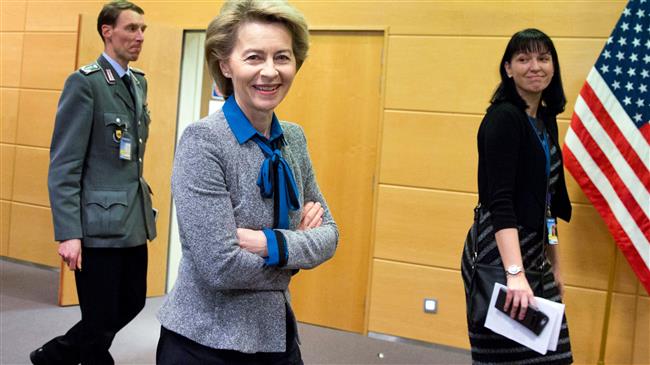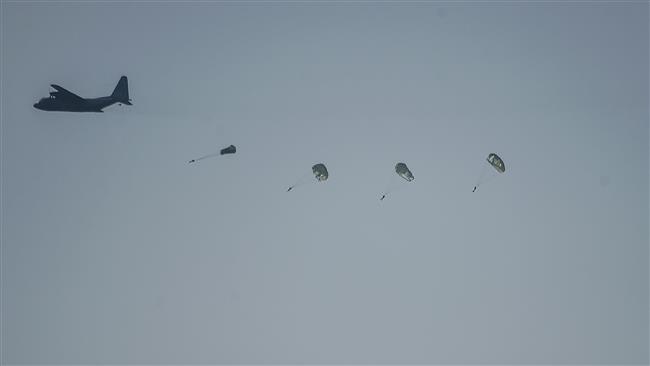NATO ministers to discuss strains with US over EU military cooperation
Defense ministers with the North Atlantic Treaty Organization (NATO) have met in Brussels to discuss Washington’s concerns over EU plans for closer military ties between the bloc’s members, and increasingly strained US-Turkey relations.
The US is concerned that EU plans for closer military ties between the bloc’s members risk undermining NATO as the alliance confronts Russia.
On Tuesday US ambassador to NATO Kay Bailey Hutchison ramped up the pressure, warning the EU that there could be serious consequences if it shuts US arms companies out of cooperation projects.
"Certainly we do not want this to be a protectionist vehicle for the EU and we're going to watch carefully, because if that becomes the case then it could splinter the strong security alliance that we have," she told reporters.
Katie Wheelbarger, a senior Pentagon official who covers NATO, said the US wanted to ensure that any closer EU co-operation did not detract from NATO members’ roles in Afghanistan and Iraq.
“We don’t want to see EU efforts pulling requirements or forces away . . . from Nato and into the EU,” she said.
The EU's so-called permanent structured cooperation on defense agreement, known as PESCO, has projects in view to develop new military equipment and improve cooperation and decision-making.
Wheelbarger said Washington was supportive of PESCO “as long as it’s complementary to and not distracting from NATO’s activities and requirements.”
During the NATO meetings in Brussels, US Defense Secretary James Mattis will urge his colleagues attending the NATO meeting to increase their nations’ military spending.
The US also wants to bolster co-operation among its NATO allies as Washington puts the threat from Moscow at the forefront of its new national defense strategy.
US President Donald Trump has repeatedly urged US NATO allies to increase their share of spending to ease Washington's burden.
US row with Turkey
Washington and Ankara, two of the transatlantic alliance's most important members, are at loggerheads over Turkey's military offensive in northern Syria. US Secretary of State Rex Tillerson on Tuesday warned it was detracting from the fight against the Daesh terrorist group.
Even more serious than PESCO could be the developing row between the United States and Turkey over Ankara's "Operation Olive Branch," launched last month against the Kurdish People's Protection Units (YPG).
Turkey launched the so-called Operation Olive Branch in a bid to eliminate the US-backed YPG, which Ankara views as a terror organization and the Syrian branch of the outlawed Kurdistan Workers' Party (PKK). The latter has been fighting for an autonomous region inside Turkey since 1984.
The operation was launched days after Washington said it would work with the Kurdish militants to set up a 30,000-strong border force near Turkish soil, a move that infuriated Ankara.
The YPG, which is operating under the larger US-backed Kurdish-dominated Syrian Democratic Forces (SDF) militia coalition, is fighting against Daesh terrorists without obtaining any official authorization from Damascus, which calls the Kurdish forces “traitors” to the Syrian nation.
US ambassador to NATO Kay Hutchison said Turkey remained an important ally and the two sides were trying to resolve the dispute.
Mattis is to meet his Turkish counterpart on the sidelines of the meeting on Wednesday in what the allies said is a bilateral issue.
"I don't see any role at all for NATO," German Defense Minister Ursula von der Leyen told reporters when asked what NATO could do to defuse tension between the two countries.
"But of course these developments (regarding the YPG) are of great concern to us and they will be part of the talks which are happening today."
Hamas thanks Iran, Resistance Front following achievement of ceasefire in Gaza
'Capitulation': Israeli officials and media concede Gaza defeat as truce unfolds
'Gaza has won': Social media users react to ceasefire with mix of relief, joy
Iran seeks South Korea’s assistance for AI, fiber-optic projects
VIDEO | Iran's 'Eqtedar' (Power) maneuver
Israel hits HTS military target in Syria for 1st time since fall of Assad
VIDEO | Press TV's news headlines
Israel has slaughtered 13,000 students in Gaza, West Bank














 This makes it easy to access the Press TV website
This makes it easy to access the Press TV website